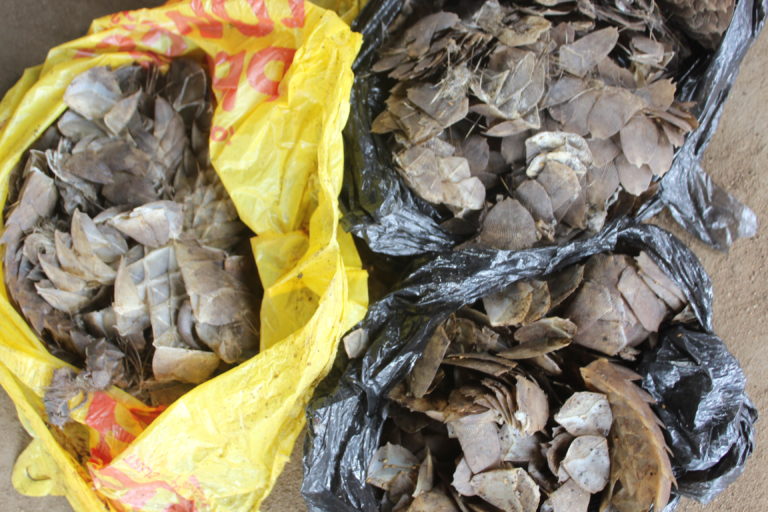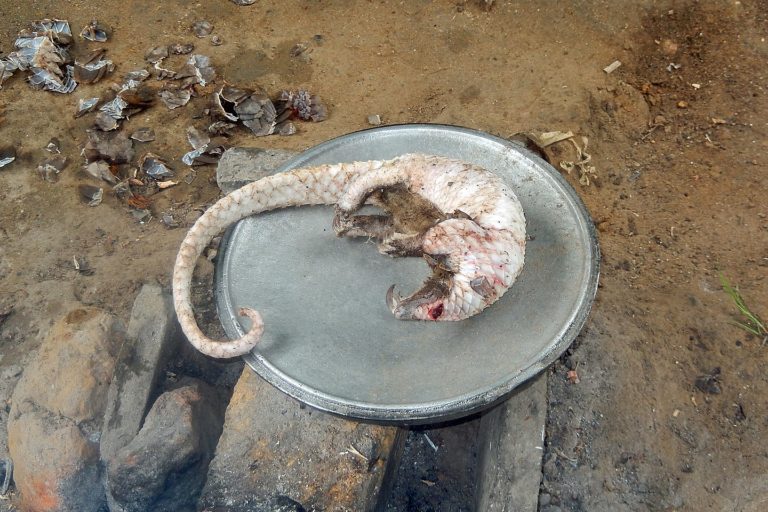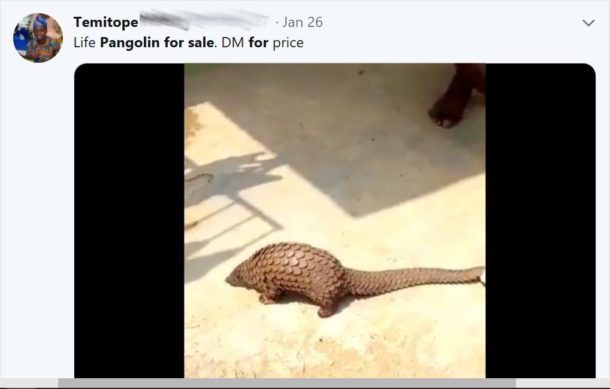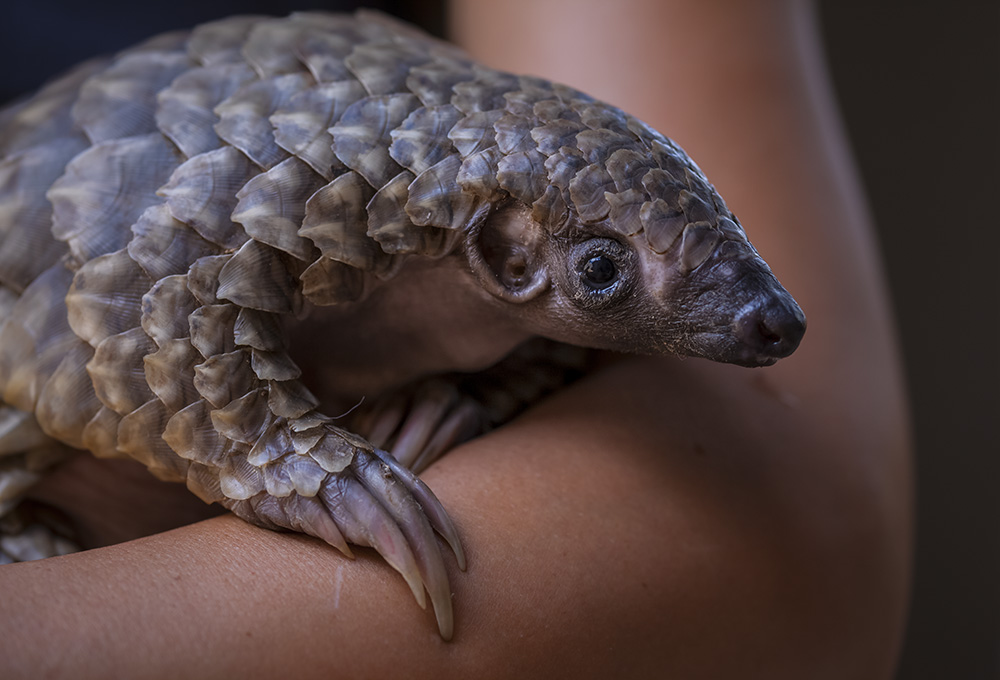By Tessa Knight• 29 July 2019
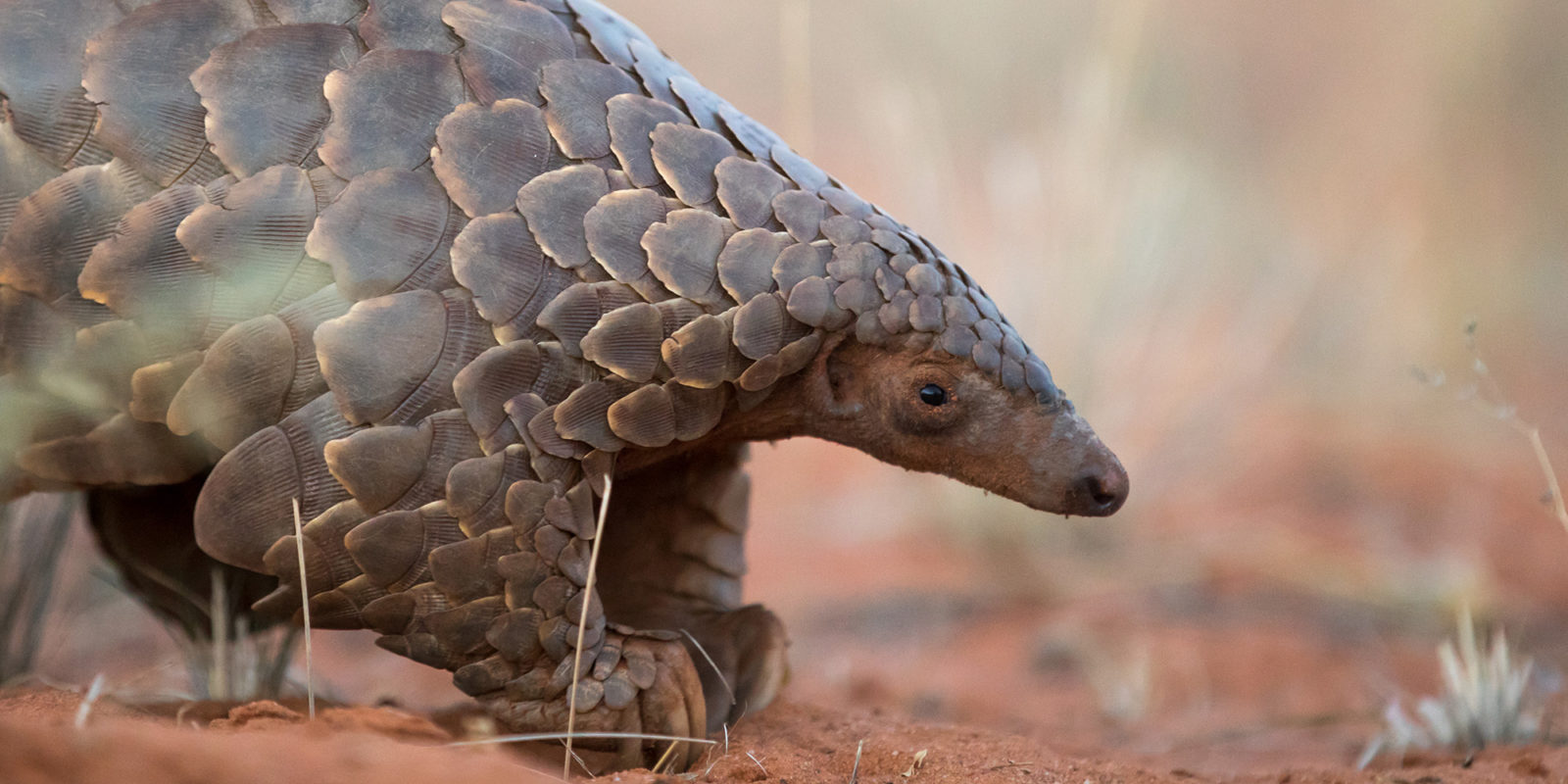
A Temminck’s pangolin on the look-out for ants and termites. (Photo: Still from Eye of the Pangolin)
Pangolin numbers are dwindling at alarming rates – in South Africa and across the globe – and the future appears bleak for these small, relatively unknown creatures.
On July 10 two men, Nkosikhona Ndebele and Mphumelelo Keya, were arrested in a shopping centre in Muizenberg, Cape Town for the illegal possession of pangolin scales. They will appear in court again in August. A week before a sting operation that led to the arrests, Takalani Mudau was arrested for allegedly trying to sell a live pangolin at a mall in Centurion, Gauteng. Mudau’s case has also been postponed.
Reports such as these are common in South Africa and the world. According to Bruce Young, a South African documentary filmmaker and producer of Eye of the Pangolin: The Search for an Animal on the Edge, in the past 10 years, the demand for pangolins has skyrocketed at an alarming rate, despite very few people knowing of their existence and very few arrests being made worldwide.
Also known as scaly anteaters, pangolins are the only mammal completely covered in protective scales. They are found in Asia and Africa, with Asian pangolin numbers now critically low, although accurate estimates are not available. In South Africa, the Temminck’s ground pangolin is found predominantly in the former Transvaal, KwaZulu-Natal and Western Cape. The animals are taken from the wild to be exported mainly to China and Vietnam, where their scales are used in traditional medicines.
Today pangolins are the most trafficked mammal in the world, with more scales being sold than all other illegally traded animals combined, said Young. For the past two years, it has been illegal to trade in any form of pangolin product, while some countries still allow commercial trading of ivory and rhino horn.
Young believes the spike in the number of animals taken out of the wild is because people have become more aware of the demand, and are aiming to provide a steady supply at a price that is widely publicised in the press.*
“We tried not to pinpoint locations where we found pangolins or put the value of the animals on the screen. If you’re not careful you can play into the hands of the traders and actually help them,” said Young.
In South Africa, the Temminck’s pangolin or Cape pangolin is usually trapped and sold while still alive after being taken out of the wild. Because the animals curl up into a defensive ball when under threat, once found they can easily be put into a backpack and taken out of the wild.
“All you have to do is find them. It’s not like shooting a rhino and cutting its horn off. Pangolin are so easy to poach,” said Young.
Once they have been taken out of the wild, poachers attempt to contact potential buyers, which is where Professor Ray Jansen comes in. After hearing about the plight of pangolins more than a decade ago, Jansen founded the African Pangolin Working Group in 2011 and has dedicated his life to the endangered mammals.
Jansen works closely with law enforcement to ensure that pangolin poachers are brought to book. Either he receives a tip-off from a member of the public who has seen or been offered a pangolin, or the poachers contact him directly trying to sell a pangolin they have captured, or pangolin scales.
When asked why a poacher would try to sell pangolins to the founder of the African Pangolin Working Group, Jansen admitted he did not know the answer.
“I think they Google Pangolin, see my name and don’t read much more,” he said, chuckling. “They know how illegal it is, so you have to be careful when you approach them. I never offer them any money, I first say I need to know that the animal is healthy and then we’ll talk business.”
After making contact, Jansen seeks out a court order to ensure the poachers are not able to claim entrapment later in court, then orchestrates a sting operation in conjunction with law enforcement in South Africa and neighbouring countries. Jansen told Daily Maverick he frequently trains law enforcement and border patrol units in South Africa and neighbouring countries to ensure that pangolin poachers are caught, and pangolin products don’t make it out of the country.
“Before we got involved they were given a R500 fine or a R1,000 fine, now we’re locking them up for seven years,” said Jansen.
According to the National Environmental Management: Biodiversity Act (Nemba), anyone caught trading in illegal animals can be liable to a fine of R10-million, 10 years in prison or both. According to Jansen, Nemba sentencing has never been enacted in full with regards to pangolin poaching.

A pangolin is kept in captivity by illegal poachers in South Africa. (Photo: Ray Jansen)
Pangolins are elusive creatures, with three of the four African species only coming out at night. The number of animals in the wild is not definitively known as their secretive nature makes them hard to track, and very little is known about the animals.
Of the eight remaining species, the four African species are listed as vulnerable, two of the four Asian species are endangered and the other two are considered critically endangered by the Convention on International Trade in Endangered Species (CITES).
At the heart of the industry on both continents is extreme greed and extreme poverty. Young and Jansen acknowledge the realities around poverty and poaching, particularly in South Africa and Zimbabwe. Illegal animal trade is lucrative, and individual poachers often ask Jansen to pay them more money than many South Africans make in a lifetime.
Although poaching and poverty are often intertwined, as Asian pangolin numbers decreased, the African pangolin trade started to become more commercialised.
“More and more we’re not finding that it’s just people who want to survive. These are highly skilled, highly motivated crime syndicates that are poaching. This is big business,” said Young.
Jansen also knows just how organised the poaching business is, having frequently come into contact with syndicates of pangolin poachers and smugglers.
“The industry moved from an opportunistic, ‘Let’s grab that animal and sell it’ situation to a business, to organised crime. Now we find pangolins in the same room as rhino horn, elephant tusks and perlemoen. And often [the poachers] are armed.”

A Temminck’s pangolin is fitted with a tracking device that allows researchers to monitor the animals. (Photo: Still from Eye of the Pangolin)
A 2017 study estimated that up to 2.7 million pangolins are taken out of forests in central Africa every year, a number that would be difficult to obtain with individual, unorganised people catching the occasional animal to feed their family. This year alone, 68 tonnes of pangolin scales have been taken out of Africa, said Jansen.
“That’s about 1,800 animals per tonne,” or about 123,000 pangolin removed from the wild, said Jansen.
So far in 2019, the African Pangolin Working Group has rescued 16 pangolins in South Africa, although some are believed to have been brought in from Zimbabwe. According to Jansen, this is a reduced number from previous years.
“This time last year we were in the 30s. Either it’s going deeper underground or they’re being more careful, or they’re trading less.”
In 2018, the working group rescued 37 pangolins. But pangolin rehabilitation is complicated, and with so little information available on the species, developing proper rescue techniques has been a long and difficult process. The day before speaking with Daily Maverick, one of the two pangolins Jansen had recently rescued died.
“We’ve had a success rate improvement from about 50% to 75-80% and that’s great. But they are super-sensitive animals, so when they get knocked down they struggle to bounce back.”
“The one I pulled out of the trade in Pretoria two weeks ago, he must have been in [the poacher’s] captivity for about two weeks because he had ripped all of his front digging claws right down to the blood and the nerves. So he struggles to dig open the ant nests. But they have a phenomenal sense of smell, so what he does is he smells out the ants and then he stares at you, and now you must come with your spade and dig them out for him.”
Many of the pangolins Jansen rescues are in poor condition, but they are the lucky ones. The vast majority of pangolins poached in South Africa will end up in Asia, dead or alive.

A small, black-bellied pangolin from the central African region is measured during rehabilitation. (Photo: Still from Eye of the Pangolin)
In her book, Poached: Inside the Dark World of Wildlife Trafficking, journalist Rachel Nuwer describes how easy it was for her to find pangolin scales at a traditional Chinese medicine market. Despite not speaking any Cantonese, Nuwer was able to pose as a Westerner looking for pangolin scales simply using the characters for “pangolin scales” written on a piece of paper.
Pangolin scales are typically dried and crushed into powder, then put into pills and capsules used to “cure” everything from arthritis to lactation issues (Nuwer told the Chinese traders that she needed the scales for her sister, to help her breastfeed). According to Jansen, many of these commercial remedies are not considered illegal by the Chinese government.
“You have to take the demand away, you have to chop the head off the snake,” he believes.
Without increased awareness and protection, both Young and Jansen are worried an 85-million-year-old species will go extinct in the near future, before the world even knows they exist. DM
In an attempt to discourage pangolin poaching, Daily Maverick chose not to include information on the going price of pangolins in South Africa at the request of Young and Jansen.
For more information on pangolins see pangolin.africa and the African Pangolin Working Group. To see Sir David Attenborough talking about pangolins, click here.



